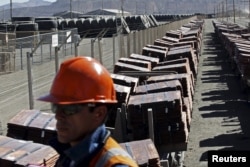Chilean copper miners who have grown reliant on cheap outsourced workers are bringing more of them in-house or bracing for salary hikes ahead of the expected passage of a pro-worker reform bill.
The legislation, on track to be approved in March, is likely to raise labor costs and marks the latest blow to mining companies in the world's No.1 copper exporter already hit by flagging productivity and prices near six-and-a-half-year lows.
The reform is set to boost the bargaining position of unions representing outside contractors, making strikes among outsourced workers more common and difficult to break, analysts and lawyers say.
Labor activists argue the reform is needed to give workers more leverage in a country with loose collective bargaining rules, and they criticize contracting as a tool for companies to undercut bargaining rights and offer substandard pay.
Companies counter that the reform will stunt growth, and say that outsourcing is vital for increasing efficiency and offering the flexibility needed to weather the volatile copper market.
Now, however, those firms are making adjustments: some are bringing contracted workers in-house to better paid positions, so as to avoid potential labor disputes. Others are preparing to pay significantly more for the same outsourced services they have used on the cheap for decades.
"There are a lot of studies being done [by mining companies], looking at how many workers can be brought in, at what mines, in which processes," said Felipe Saez, an advisor to heavy industry group Sofofa, which represents Chilean mining among other sectors.
Outsourcing has increased in Chile over the past two decades. Seventy-four percent of workers at Chile's "large" copper miners, which account for well over 90 percent of output, were contracted out as of 2014, according to government statistics. That compares with 69 percent in 2013, and 66 percent in 2006.
However, in 2015, following years of gains, the number of mining contractors in Chile fell by 12.5 percent, far outpacing total job losses among mine workers.
That is largely due to companies getting fed up with already rising labor unrest among outsourced workers, analysts say. Last year, protesting contractors with state producer Codelco blockaded and closed a mine for three weeks.
But the proposed reform, which allows unions from different contractors to join forces and lowers barriers to creating unions in small companies, among other measures, is fueling the trend, and making companies less likely to rehire outside when prices rebound.
"Under the labor reform it would be better for [mining companies] to bring contractors with sensitive labor agreements in-house, and have those workers opt for the company's benefits, so they can better control the bargaining situation," said Fernando Villalobos, a leading Chilean labor lawyer and former advisor to the Labor Ministry.
New in-house workers, however, are costly. Government data show that average per worker remuneration costs for contracted employees at copper mining companies were only 43 percent that of direct employees in 2014.
It remains unclear how many workers mining companies are prepared to bring in.
But if just 5 percent of the 163,827 total workers at Chile's large copper mines in 2014 were made direct employees, it would cost Chilean miners approximately $370 million a year.
Though that is relatively small compared to total industry-wide costs of $25.8 billion in 2014, such numbers are significant for a sector that is now struggling to maintain razor-thin margins.
New Strategies, Increased Costs
Those that do not bring contract work in-house will instead look at new ways of outsourcing aimed at cushioning against strikes that will increase payrolls significantly, insiders say.
"We're going to have to take up new methods that basically increase the cost of having the same service," Diego Hernandez, chief executive of Chilean miner Antofagasta Plc, told Reuters in January.
One method he suggested was having overlapping contracts, whereby a worker from one contracting firm could replace a striking worker.
Mining companies say they are also concerned about additional aspects of the bill apart from contracting. Hernandez told Reuters he worried that restrictions on replacing striking workers were so strict they could put physical infrastructure at risk while mines go unmanned.
Representatives of other sectors such as agriculture, shipping, forestry, and construction have told Reuters they are also concerned about the reform and the future of contracting, which Chilean labor law has long only loosely regulated.
Business leaders have lobbied lawmakers hard to water down the bill, which has been mired in a bitter legislative fight for a year, industry insiders and a senate aide say.
Eugenio Tuma, a center-left senator, told Reuters that lawmakers had softened some stringent aspects of the reform, such as bargaining rights within small businesses.
But, like the other senators in the governing coalition calling for adjustments, he is confident the law will pass with the most significant provisions intact.
"We think there's been abuse on the part of the employers," he said. "This delivers the tools that workers need to level the playing field."







